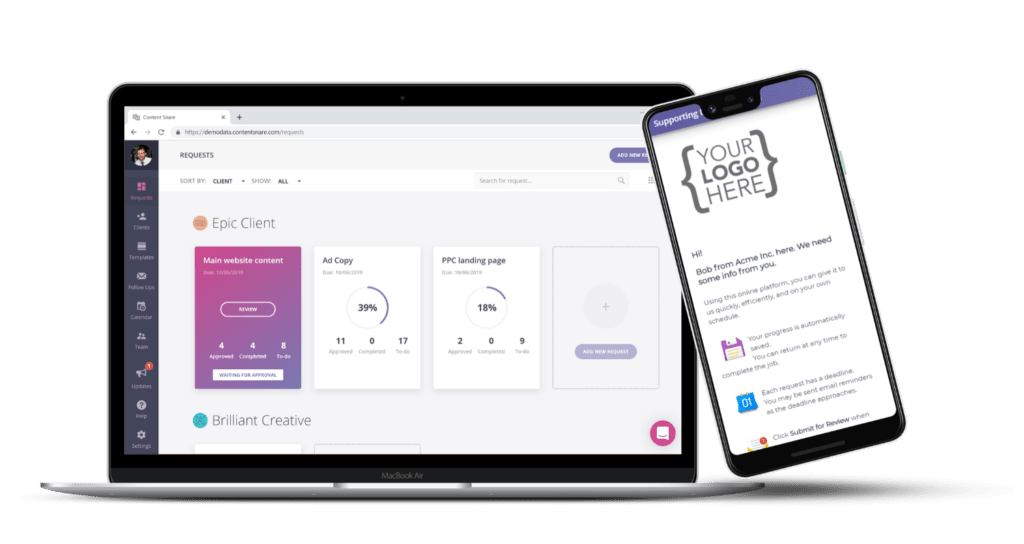Two reasons why a job can rock your socks — either because you love the work you’re doing, or you love the people you work with. (If you love neither, then heck, leave. Life’s too short!)
Because the quality of a team can make or break a company’s culture, recruiters are always on the hunt for not only the best talent but genuinely solid people that really fit what the organization’s all about.
If you’re responsible for hiring or recruiting on your team, you know just how important it is to ask the right questions in the recruitment process to get a good feel for the candidate’s skills, fit for the role, and personality. A great way to review your applicants is to ask them some pre-screening questions in a recruitment questionnaire.
Get our recruitment questionnaire template
Content Snare is here to help you in your hiring process. Sign up to access our recruitment questionnaire template and save yourself lots of time prepping your own.
Why should I use a recruitment questionnaire in the hiring process?
Creating a recruitment questionnaire for your organization can help you:
- Get a deeper understanding of the candidate's background and personality beyond what their resume or cover letter initially tells you. Listing their work experience is one thing, but telling you about their stories and accomplishments is another.
- Assess a candidate’s written communication skills e.g grammar and language skills in the way they answer (if this is relevant to the role you’re hiring for).
- Weed out candidates that aren’t very promising (like those who don’t even bother to fill in your questionnaire! That’s a no from us.)
- Save valuable time by narrowing down the best potential candidates and only inviting a handful for phone, video, or in-person interviews. This way, you spend less time with unqualified applicants and more time with the applicants that are right for the job.
- Make better use of your interview time by splitting up questions to ask in your questionnaire and more specific questions you’d rather ask in person.

What questions should I ask in my recruitment questionnaire?
Here’s a list of 30 telling questions to ask in your recruitment questionnaire to figure out if a candidate is worth bringing in for an interview or if they’re a complete waste of time. We chose fairly general questions that you can use in just about any industry you're in.
Questions about their current role
Ask these questions to understand the candidate’s motivations for leaving their current role. These questions will give you insight into what needs aren't being met in their current role be it growth, their scope of duties, or cultural fit.
- What does your typical work week look like in terms of responsibilities? How have these responsibilities changed over time?
- What is the most frustrating part of your current role? Have you ever taken steps to try and make this part of your role less frustrating? If so, what were they?
- What aspects of your role or the company culture do you dislike?
- Why do you want to leave your current job?
- In what way did this position fail to fit your expectations?
Questions about how they work best
Ask these questions to learn about what type of work environment sets this person up for success to assess whether your organization delivers on what they’re looking for.
- What characteristics are you looking for in a supervisor/manager and in your teammates?
- What makes a job fun and motivating for you? What gets you excited to come into work every day?
- What would you say your top values are when it comes to your working relationships?
- Which company’s culture has been the most supportive of you and your work?
- What would your perfect workday look like in terms of how much time you spend working independently vs collaboratively?

Questions about their growth potential
Ask these questions to get a feel for how the candidate wants to grow, what they can contribute to your team, and how equipped they are to handle the challenges of their new role.
- What are your goals for professional development? How will getting this job help you advance towards these goals?
- What do you think you can contribute to the company? Why should we pick you?
- What would you like to be doing with your career in three years' time?
- What career accomplishments from previous roles will help you to perform well in this job?
- What career challenges have prepared you for the challenges you would face in this job?
Questions about their skills
Ask these questions to find out how the candidate evaluates themselves in terms of their skills and aptitude.
- What knowledge areas are your strongest? What could you learn more about?
- What are your weaknesses? How can you overcome them?
- What are three career accomplishments you’re the most proud of so far?
- How would you rate your teamwork skills out of 5? If not a 5, what would you change?
- How do you stay motivated when working independently?
Questions to get to know who they are outside of work
Ask these non-work-related questions to get a better idea of the candidate’s day-to-day personality.
- What are some of your passions and hobbies outside of work?
- Describe yourself to us in 3 words/adjectives
- How would your closest friends and family describe you?
- Do you have any other skills or knowledge that might be helpful but aren’t on your resume?
- Tell us about one of the most positive experiences you ever had, be it travel, volunteering, or anything you see fit. Why was that so special to you?

Housekeeping/eligibility questions
These questions will help you understand if the candidate meets basic eligibility requirements. They’ll also help you gauge where the candidate is in the hiring process with other companies. If they’re a fit and you find out they’re already entertaining other offers you might want to speed up your decision and pull the trigger!
- What salary range are you expecting for the role you applied for?
- Can you provide your strongest work sample that demonstrates your qualifications for this job? (If applicable)
- Are you currently interviewing with any other companies?
- Has another business made you an offer recently?
- When can you start if you’re hired?
Tips for using questionnaires in your recruitment process
Before we wrap up, here are a few pointers on using recruitment questionnaires in your hiring process.
Don’t ask too many screening questions
Screening questions are great for helping you choose the best candidates to invite to interviews, but the last thing you want to do is scare people off by asking way too many questions. Sending a questionnaire with 50 questions can be extremely daunting to fill out and this might push some good talent away! Although we’ve provided 30 questions for inspiration, we recommend using about 10 questions tops.
Choose a tool that gives the best candidate experience
There are a couple of different tools you can use to send candidates your digital recruitment questionnaire. When you choose what to go with, make sure you’re mindful of the candidate experience. Make it easy for them!
When using tools like Google Forms and Gravity Forms, your candidates will have to finish the questionnaire all in one go. This means they can’t take breaks to think about their answers and come back to them later. If they exit for any reason, they’ll have to fill in all their answers again — total pain in the a**.
You can also opt for an automation platform that will make things more easy for you. For example, SureTriggers. It can be a great recruiting quiz tool. It can gather candidate replies and trigger automatic actions by connecting with Content Snare. For instance, it can automatically send a confirmation email, alert the recruiting team through WhatsApp or Slack, filter candidates for you using the Filter feature, and even arrange an interview using interview scheduling apps like Calendly and others, depending on the candidate's specified availability. This will greatly enhance and expedite the hiring procedure and reduce effort for both candidates and recruiters.
Shameless plug here, but a reason why you’d want to consider using Content Snare is because it has auto-save features built-in so candidates can have their answers saved and come back to your questionnaire when they’ve thought of that great example they want to impress you with. They can come back and pick up where they left off last.

Another handy little bonus of using Content Snare is that once you send your candidates the questionnaire, the tool will help you by sending your candidates email reminders until they’ve sent in their completed questionnaire. All you have to do is choose the frequency of the reminder emails and Content Snare will take care of it. Not having to send those reminder emails means you get a bit of time back to yourself to enjoy another coffee at your desk or hunt down the next potential candidate to contact!
We hope this post has been a help to you, whether that means giving you inspiration for questions to ask, or considering some software to use.
Have any other killer questions you like to ask candidates in your interviews? Let us know some good ones in the comments!




Thank you for this amazing questionnaire and the tips for using it. I think this questionnaire contains mostly general questions as you said, but I need more specific questions with key answers that demonstrates if the candidate is highly trustworthy or not. In our company trust is much more valuable than skills. For example in navy seal recruitment strategy they hire high-trust, low-performance candidates rather than low-trust high-performance ones! How could possibly some questions be added to demonstrate the level of trustworthiness of the candidates? Moreover how can we add some questions showing if the candidate would stay in the company or would leave for another job after a short while?
That is indeed very specific. As this is so specific to what you do, I believe these are questions you're going to have to plan out yourself. Navy Seal recruitment is not within our experience!